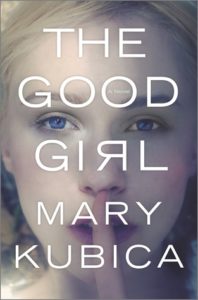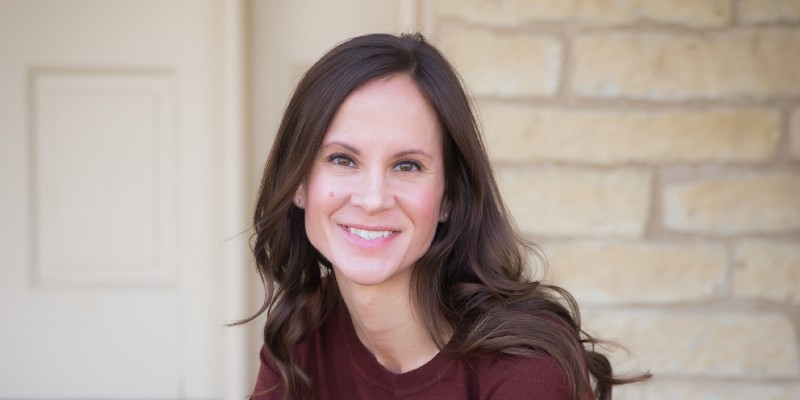Mary Kubica is a very private person. So private, in fact, no one but her husband knew she’d started writing a novel, The Good Girl. And even then, she didn’t let him read her manuscript.
She fell in love with writing when she was almost a teenager, she says. “It was one of those things that when I discovered it, I never stopped…It was very much a hobby for me. I never thought it was something I would pursue.”
She studied history and English in college and took one creative writing class where she wouldn’t even share her written musings with classmates. After college she taught history in the Chicago suburbs to high school freshmen and juniors. Standing in front of a classroom not far from where she grew up energized her, she says. This says a lot about Kubica. She’s not shy, just private.
After she married and had her first child, she finally started to take writing seriously. Her daughter was just three weeks old, and being at home all the time, Kubica found time to write when her baby was napping. And then a lightbulb went off that changed her life.
“When I started The Good Girl, I thought it was going to be a love story…It was starting to develop questions that I didn’t have answers to…So it was totally by accident (that it became a mystery).”
She’d never written a novel before. Ever since she was young, she’d started but never finished one either. She just lost interest. “Not with The Good Girl,” she says, “because I put the elements of mystery in it, and it kept my attention. I knew I was supposed to be writing.”
“It was the first thing I wrote that has any suspense and mystery elements at all. I felt it was my calling…It was the first thing that I really felt I wanted to get out into the world.”
The Good Girl is about a young woman, Mia Dennett, from a prominent family that is fractured, a fact no one is willing to admit, not even to themselves. But Mia feels it. Her dad is a prominent judge and distant father. Her mother, a middling socialite. Mia is kidnapped and held in a cabin deep in the woods by a young man she eventually falls for. The Good Girl explores their evolving relationship and ends with a shocking twist.
Kubica wrote her novel from several points of view: Mia, her kidnapper, her mother, and a detective who’s investigating her case.
“I’m not a plotter, so it started with this idea of a missing woman…I liked the idea of exploring it from different characters’ points of view. I didn’t write the book in the way you read it…I definitely had to tweak things, so everything was revealed at the right point…that was really a fun experience.”
She struggled to find the best way to organize it, so it took a while. In fact, it took five years to interweave all of her characters’ stories. “I knew in my head if I jumped back and forth, it would get very jumbled.” And it did for a while.
And to add more hurdles for the young writer, the story flashes from present day to the past. Doing both in a single story is no easy task. For a first-time novelist, it’s like reaching the summit of Mount Everest and planting your literary stake on your first try.
When she finally sent a query letter in search of an agent, she was still navigating the guardrails protecting her private writing world. “I think I had to find the confidence to put my work out there.”
And it was certainly out there. She contacted 100 agents, and only three eventually expressed interest. But over the months, all three turned her down. She waited two years for a positive response, and none came.
And then one day she received a call from Rachel Dillon Fried, a former agent’s assistant. She’d read Kubica’s manuscript two years earlier, but the agent she worked for took a pass. Fried never forgot Kubica’s manuscript and how much she liked it. When she finally was promoted to agent, her top priority was to make The Good Girl one of her first acquisitions.
She sold Kubica’s novel to Mira Books and editor Erika Imranyi took over. During the editing process Kubica struggled to handle her editor’s criticism, something she’d never experienced because she’d kept her manuscript to herself. This was the first time anyone had cast a critical eye on every line of her work.
“It was hard. You need to be prepared for it,” Kubica says. “That feedback from the editor is so crucial to the process and you have to get used to it. I’ve met some first-time authors who pull back, but it’s so important.”
Even after she was published, she still worried her words were inadequate. “The first time I saw The Good Girl in a bookstore my reaction was it was out there for everyone to see…I had no idea though, how it was going to do—if anybody was going to read it. I’m also a bit of a pessimist. I was just thrilled to be published.”
However, she says, “I knew that they (Mira) believed in it and that was huge.”
And boy did they. Her publisher Mira Books (a division of Harlequin before it merged with HarperCollins) was so enthusiastic about The Good Girl that they paid to splash it on the cover of Publisher’s Weekly where it received a starred review.
But as every writer knows, not every review is stellar and over the years Kubica has had to learn how to deal with bad reviews. “You’re never going to please everybody, and I’ve had to tell myself that…I have to write what I want to read…That’s all I can control. I can’t control how the reader responds to it.”
She says it took her time to deal with opening up to the world. “My editor even told me to stay off Goodreads reviews.”
One of her biggest thrills was attending the BookExpo America when it was at New York’s Javits Center. When she arrived, she saw Mira’s giant banner hanging from the ceiling announcing her novel.
The hardback sold well, but never in the bestseller stratosphere. About a year later, eBook sales picked up just as The Good Girl began its paperback run and sales exploded. Kubica hit the New York Times bestseller list with her first novel, and it continued to sell. Today, more than a million copies have sold.
Not bad for a debut author.
Since her first novel, Kubica has continued to tell her stories through multiple points of view—in fact all her subsequent novels are written in her signature multiple point-of-view style. And since her first novel she’s streamlined her writing process by first writing each character’s entire story. She then weaves the parallel plots together into yet another bestselling suspense read.
Writers as a whole suffer from all kinds of insecurities. They are shy, introverts, and like in Kubica’s case, sometimes very private. They struggle every day to overcome these personality glitches because they know they have something to say and must reach out to say it. So, it’s no small accomplishment for someone who values her privacy the way Kubica does, who never saw herself as pursuing a writing career, still manage to lay herself bare to the world. And the world is a lot happier for it.

___________________________________
The Good Girl
___________________________________
Start to Finish: 5 years
I want to be a writer: Age 12 or 13
Experience: Writing was my hobby.
Agents Contacted: 100
Agent Rejections: 97
Time to find agent 2 years
First Novel Agent: Rachel Dillon Fried
First Novel Editor: Erika Imranyi
First Novel Publisher: Mira Books
Age when published: 27
Inspiration: Examining everyday people and what they do in extraordinary situations. I’m a news junky so I get a lot of ideas there, and put my own spin on it.
Website: MaryKubica.com
Like this? Read the chapters on Lee Child, Michael Connelly, Tess Gerritsen, Steve Berry, David Morrell, Gayle Lynds, Scott Turow, Lawrence Block, Randy Wayne White, Walter Mosley, Tom Straw. Michael Koryta, Harlan Coben, Jenny Milchman, James Grady, David Corbett. Robert Dugoni, David Baldacci, Steven James, Laura Lippman, Karen Dionne, Jon Land, S.A. Cosby, Diana Gabaldon, Tosca Lee, D.P. Lyle, James Patterson, Jeneva Rose, Jeffery Deaver, Joseph Finder, Patricia Cornwell, and Lisa Gardner.

















